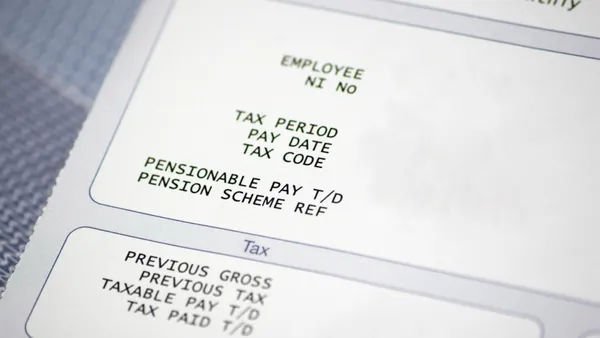Dive Brief:
- Roughly two-thirds of companies responding to Pearl Meyer’s annual executive pay practices survey expect similar year-over-year salary increases, but there are signs wage growth may be slowing, according to the findings released Dec. 19. Specifically, only 9% of the respondents expect higher percentage rates, compared to 40% last year. By contrast, 24% expect lower-level increases, compared to 6% in 2023.
- The survey also found that a growing number of compensation committees are becoming more involved with broader human capital oversight, especially among publicly traded companies. Similar to last year, around 20% of companies expect to include environmental, social and governance-related issues as a stand-alone metric in their incentive plans, although just 5% expect to add new ESG metrics, a noticeable decrease from 12% for 2023. Additionally, slightly more than 40% are considering changing their short-term incentive plans for senior execs, most commonly adding financial metrics.
- “Salaries remain above historical norms, but it is a different landscape from this time last year,” Bill Reilly, the advising firm’s managing director who developed the survey, stated in a press release. “Things are certainly cooling off, consistent with declining overall inflation levels, but the outlook is not gloomy.”
Dive Insight:
The findings align with other recent surveys indicating pay increases may dip in 2024 but stay above past years’ averages. The reason: Employers are looking to remain competitive for talent, and pay is a key factor, a WTW research director explained in a statement related to WTW’s report from early December.
Employers have also said they plan to promote more than 8% of their employees next year and spend part of their compensation budgets on promotion-related pay increases, according to an August survey by Mercer.
However, companies may have lowered their expectations about how high next year’s raises will be. Earlier this year, the median increase was expected to hover around 4%, according to both the WTW survey and a Salary.com report from October. But according to the Pearl Meyer survey, the median expected increase for broad-based employees is down to 3.7%; for senior execs — CEOs and their direct reports — it’s 3.5%, a decline for both groups from the 4% expectation reported last year.
But these are just median numbers, and depending on the company and what kinds of workers are the hardest to find, not all raise rates will be the same for all jobs in all locations, experts have cautioned. Giving blanket high raises to everyone, especially for companies with a lot of people in different locations can lead to overspending and future layoffs, they say.
“Data provides an important context for any company’s compensation programs, but it should not be the driver,” Reilly said. “It is a helpful point-in-time reference but cannot accurately account for your organization’s unique circumstances,” he added. Instead, companies should “examine the data and understand your position relative to trends, but always base compensation decisions on your talent management strategy and business goals,” Reilly recommended.
The survey also confirms that ESG will continue to factor in many 2024 executive pay plans, despite growing opposition to ESG initiatives. However, the focus has changed, according to a recent WTW presentation. Boards and companies are looking at key elements of ESG and other nonfinancial metrics that are most relevant to, and hold the most strategic value for, their company and their industry, a WTW compensation executive pointed out.
The Pearl Meyer findings are based on a survey of 148 publicly traded companies, 110 private, for-profit businesses and 46 non-for-profit organizations, the firm said.













